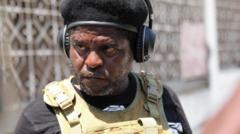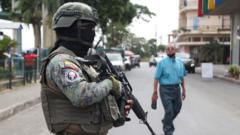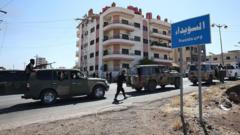Federal prosecutors in the United States have charged Jimmy Cherizier, a notorious Haitian gang leader known as "Barbecue," with soliciting funds from the Haitian diaspora for his violent gang activities, raising concerns about widespread violence and instability in Haiti.
US Takes Action Against Notorious Haitian Gang Leader "Barbecue"

US Takes Action Against Notorious Haitian Gang Leader "Barbecue"
Federal charges filed against Jimmy Cherizier highlight the crisis in Haiti-driven by gang violence.
In a significant move, US federal prosecutors have announced criminal charges against Jimmy Cherizier, the prominent leader of the Haitian gang alliance known as "Viv Ansanm," which significantly dominates the capital, Port-au-Prince. Cherizier, who is currently at large in Haiti, along with US citizen Bazile Richardson, faces allegations of soliciting financial support from the Haitian diaspora community in the United States to fund gang operations and procure firearms, actions that violate US sanctions.
The indictment details how Cherizier, a former police officer, leads a group accused of numerous violent crimes, including multiple murders and kidnappings. Cherizier's leadership has been marred by horrific actions, including the notorious 2018 La Saline massacre that left 71 people dead and hundreds of homes destroyed. In response to his criminal activities, US officials have placed a $5 million bounty on his capture.
During a recent press conference, US Attorney Jeanine Pirro emphasized the grave nature of the crimes Cherizier and his associates are charged with, stating, "There's a good reason that there's a $5 million reward for information leading to Cherizier's arrest." Despite facing federal charges and international sanctions from bodies including the UN and sanctions imposed by Canada and Britain, Cherizier remains influential and heavily guarded on the streets of Haiti.
In addition to supporting Cherizier, Richardson has also received attention for his role in fundraising efforts for the gang, leading to his arrest in Texas last month. Authorities describe his actions as instrumental in "bankrolling Cherizier's violent criminal enterprise," which has played a crucial role in the ongoing security crisis affecting the nation.
Haiti has been grappling with a humanitarian disaster as gang violence escalates, especially following the assassination of President Jovenel Moïse in 2021. Today, the country faces economic turmoil, widespread lawlessness, and a severe food security crisis, with over half its population—approximately 5.7 million people—experiencing acute food insecurity. International efforts, such as the UN backed Kenyan-led security force, have struggled to restore order in the capital, while the humanitarian situation continues to deteriorate.
The future of Haiti remains uncertain as gangs vie for control and violence threatens the stability and safety of its citizens.
The indictment details how Cherizier, a former police officer, leads a group accused of numerous violent crimes, including multiple murders and kidnappings. Cherizier's leadership has been marred by horrific actions, including the notorious 2018 La Saline massacre that left 71 people dead and hundreds of homes destroyed. In response to his criminal activities, US officials have placed a $5 million bounty on his capture.
During a recent press conference, US Attorney Jeanine Pirro emphasized the grave nature of the crimes Cherizier and his associates are charged with, stating, "There's a good reason that there's a $5 million reward for information leading to Cherizier's arrest." Despite facing federal charges and international sanctions from bodies including the UN and sanctions imposed by Canada and Britain, Cherizier remains influential and heavily guarded on the streets of Haiti.
In addition to supporting Cherizier, Richardson has also received attention for his role in fundraising efforts for the gang, leading to his arrest in Texas last month. Authorities describe his actions as instrumental in "bankrolling Cherizier's violent criminal enterprise," which has played a crucial role in the ongoing security crisis affecting the nation.
Haiti has been grappling with a humanitarian disaster as gang violence escalates, especially following the assassination of President Jovenel Moïse in 2021. Today, the country faces economic turmoil, widespread lawlessness, and a severe food security crisis, with over half its population—approximately 5.7 million people—experiencing acute food insecurity. International efforts, such as the UN backed Kenyan-led security force, have struggled to restore order in the capital, while the humanitarian situation continues to deteriorate.
The future of Haiti remains uncertain as gangs vie for control and violence threatens the stability and safety of its citizens.
















